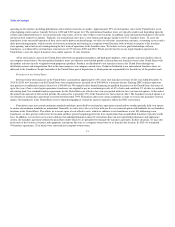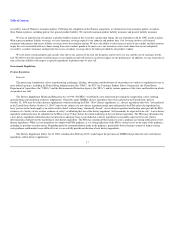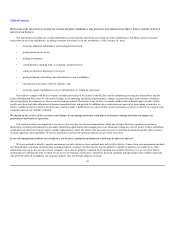GNC 2011 Annual Report Download - page 21
Download and view the complete annual report
Please find page 21 of the 2011 GNC annual report below. You can navigate through the pages in the report by either clicking on the pages listed below, or by using the keyword search tool below to find specific information within the annual report.
Table of Contents
regulations, among other things, impose significant recordkeeping requirements on manufacturers. The GMP requirements are in effect for all manufacturers,
and the FDA is conducting inspections of dietary supplement manufacturers pursuant to these requirements. There remains considerable uncertainty with
respect to the FDA's interpretation of the regulations and their actual implementation in manufacturing facilities. In addition, the FDA's interpretation of the
regulations will likely change over time as the agency becomes more familiar with the industry and the regulations. The failure of a manufacturing facility to
comply with the GMP regulations renders products manufactured in such facility "adulterated," and subjects such products and the manufacturer to a variety
of potential FDA enforcement actions. In addition, under the Food Safety Modernization Act ("FSMA"), which was signed on December 27, 2010, the
manufacturing of dietary ingredients contained in dietary supplements will be subject to similar or even more burdensome manufacturing requirements, which
will likely increase the costs of dietary ingredients and will subject suppliers of such ingredients to more rigorous inspections and enforcement.
The FDA has broad authority to enforce the provisions of federal law applicable to dietary supplements, including powers to issue a public warning or
notice of violation letter to a company, publicize information about illegal products, detain products intended for import, request a recall of illegal products
from the market, and request the Department of Justice to initiate a seizure action, an injunction action, or a criminal prosecution in the U.S. courts. The
FSMA expands the reach and regulatory powers of the FDA with respect to the production of food, including dietary supplements. The expanded reach and
regulatory powers include the FDA's ability to order mandatory recalls, administratively detain domestic products and administratively revoke manufacturing
facility registrations, effectively enjoining manufacturing of dietary ingredients and dietary supplements without judicial process. The FDA has yet to exercise
such expanded reach and regulatory powers. The regulation of dietary supplements may increase or become more restrictive in the future.
The FTC exercises jurisdiction over the advertising of dietary supplements and over-the-counter drugs. In recent years, the FTC has instituted numerous
enforcement actions against dietary supplement companies for failure to have adequate substantiation for claims made in advertising or for the use of false or
misleading advertising claims. We continue to be subject to three consent orders issued by the FTC. In 1984, the FTC instituted an investigation of General
Nutrition, Incorporated, one of our then existing subsidiaries, alleging deceptive acts and practices in connection with the advertising and marketing of certain
of its products. General Nutrition, Incorporated accepted a proposed consent order, under which it agreed to refrain from, among other things, making certain
claims with respect to certain of its products unless the claims are based on and substantiated by competent and reliable scientific evidence. We also entered
into a consent order in 1970 with the FTC, which generally addressed "iron deficiency anemia" type products. As a result of routine monitoring by the FTC,
disputes arose concerning our compliance with these orders and with regard to advertising for certain hair care products. While we believe that General
Nutrition, Incorporated, at all times, operated in material compliance with the orders, it entered into a settlement in 1994 with the FTC to avoid protracted
litigation. As a part of this settlement, General Nutrition, Incorporated entered into a consent decree and paid, without admitting liability, a civil penalty in the
amount of $2.4 million and agreed to adhere to the terms of the 1970 and 1989 consent orders and to abide by the provisions of the settlement document
concerning hair care products. We do not believe that future compliance with the outstanding consent decrees will materially affect our business operations.
The FTC continues to monitor our advertising and, from time to time, requests substantiation with respect to such advertising to assess compliance with
the various outstanding consent decrees and with the Federal Trade Commission Act. Our policy is to use advertising that complies with the consent decrees
and applicable regulations. Nevertheless, there can be no assurance that inadvertent failures to comply with the consent decrees and applicable regulations will
not occur.
19
























